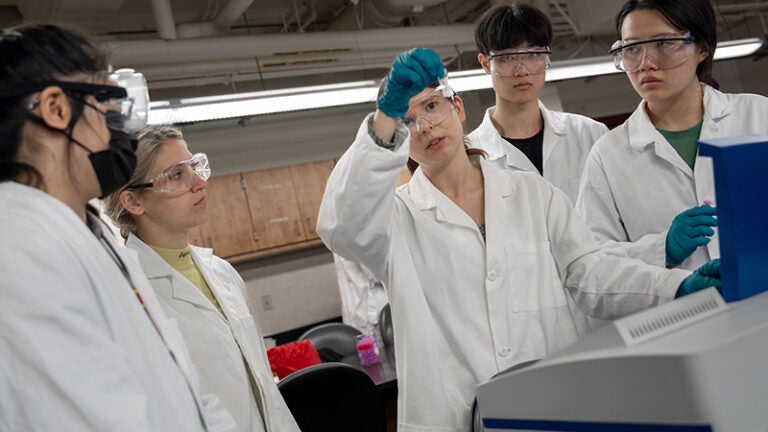
Students looking for a new major or a distinctive minor should check out these new offerings
With nearly 100 majors and more than 90 minors to choose from, the USC Dornsife College of Letters, Arts and Sciences already offers students a wealth of educational options. Now there are even more, with the addition of a new economics major, a health-related minor and a revamped structure for biological sciences.
These changes aim to prepare students for careers in a variety of fields, and also help them connect better with classmates.
“At USC Dornsife, we want to give our students deep experience in some field of interest and broad exposure across multiple disciplines. We also want our students to have the flexibility to build their own programs of study,” says Emily Hodgson Anderson, college dean of undergraduate education. “For all of these reasons, we are working consistently to expand our academic options. Our students will leave USC Dornsife as fully educated individuals who know how their chosen specialty fits into a broader program of study.
Biological sciences major offers new emphases
“The number one complaint we got in the biological sciences program was that we didn’t have a marine biology major for undergraduate students,” says Ian Ehrenreich, professor of biological sciences, who helped design the program’s new structure. “The second was that students didn’t feel connected to a community.”
Biological sciences is one of the most popular majors on offer at USC Dornsife, and the high volume of students can make meeting peers overwhelming.
With a restructured format for the major this fall, both of these problems have been solved. Students can now choose to add one of four emphases when they enroll in a biological sciences degree: biotechnology; ecology, evolution and environment; molecular, cellular and developmental biology; or, much to many students’ delight, marine biology.
Undergraduates all take the same foundational classes, then branch into coursework that ties directly into their emphasis. Those in the marine biology track can train in scientific diving or learn about sustainable fishery management. Biotechnology students can dig into nanomedicine, immunology and bioengineering.
Professional development workshops, lectures, hikes and other events are in the works for each emphasis, enabling students to connect with their like-minded peers in small group settings.
The new coursework is also designed to help them in their careers. “We wanted to send students out into the wider world with skills they can immediately use,” says Ehrenreich, who notes that the emphasis will appear on their transcripts and help students stand out to employers.
Economics adds behavioral psychology and economics major
Training students for careers is top of mind over in the economics department, as well. Their newly added behavioral economics and psychology major prepares students to answer an increasingly important question for companies: Why do consumers make the decisions they do?
Traditional economics assumes that consumers are rational, says Professor of Economics Isabelle Brocas, who helped to design the new major, but now many economists believe that all sorts of complicated, often “irrational” psychology goes into our decision-making.
The desire to “keep up with the Joneses” may inspire our purchase of a luxury purse more than our budget. Too many choices of toothpaste may turn consumers off rather than excite them.
“This has a big impact on economics. It’s not just ‘noisy’ behavior, and these irrational consumer decisions don’t all cancel each other out,” says Brocas. To better understand economics, and to implement better economic policy, we should therefore try to understand why people are, well, weird sometimes.
In this new major, students will train in traditional economic theories while also taking classes on topics like human judgement and social psychology. This prepares them for work in fields like tech, where understanding consumer behavior online is central to bringing in sales, or in government policy, shaping better economic systems.
New minor in mind-body studies
It’s not just career paths that inspired the new educational offerings. A mind-body studies minor offered by the physical education and mind-body health department aims to help students manage stress and live healthier lives.
With incoming college students reporting high levels of anxiety and stress, and as the obesity rate ticks upwards, this sort of training can be crucial for young adults.
Some 20 students have already enrolled in the minor, taking classes on nutrition, sleep habits and physical fitness. The program got a jumpstart back in May, when students embarked to Tulum, Mexico, for a weeklong yoga and meditation retreat as part of the minor.
Students aiming for careers in health care can carry lessons from this minor to their future patients. “I hope to use what I learn from the mind-body studies minor, particularly in regard to how we train our brain, to assist dementia patients,” says Christina Maineri, who is majoring in neuroscience and cognitive science.
Students who want to enroll in any of these majors or minors should contact their advisor.